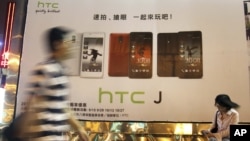TAIPEI, TAIWAN —
U.S.-based computer giant Apple and its chief Taiwanese competitor, HTC, have settled a series of patent lawsuits involving, among other things, the iPhone. But, since the two consumer electronics companies made the unusual announcement on Sunday, Taiwan's stock market authority has started investigating why once-troubled HTC share prices shot up to their daily limit.
The Taiwanese firm, whose name stands for High-Tech Computer, watched its global smartphone market share grow to 8.5 percent at the end of 2010, with sales revenues growing to match. It had joined a league with Apple’s iPhones, the Blackberry and handsets by Korean giant Samsung. But as global sales grew, the Taiwanese company got snagged in 20 legal cases involving patent infringements over design of Apple's signature iPhones and some of HTC's top models.
On November 11, the two litigants released a statement saying that all lawsuits had been dismissed. They did not give details on the settlement deal, but announced a 10-year license agreement for current and future patents held by both companies.
John Brebeck, senior adviser with the Taipei-based Quantum International Corporation, says the deal with Apple lets HTC make phones without worrying about another lawsuit. But he warns that the agreement does not guarantee success.
“At least they’re going to be able to ship their products. They’ll be able to do business as usual and, as a result, they have a level of predictability in their business," Brebeck says. "I don’t think it means that they’re back in the game in terms of being able to knock off Apple or Samsung or even gain market share on them, because they have to bring out a competitive product.”
HTC had made a name for itself by selling smartphones that run on Microsoft Windows and Google Android software. It also cut into Apple's market share with lower prices. The company’s sales abroad had become a talking point for Taiwanese officials eager to show that the island's tech firms are reaching consumers after doing mainly lower-profile contract work for three decades.
But HTC’s global market share had dropped to four percent in the last quarter, because of new iPhone releases plus strong competition from South Korea's Samsung smartphones. HTC revenues slipped 23 percent in the same period.
The company’s problems may not end there. On Friday, the final business day before the settlement deal was announced, HTC share prices rose seven percent, the most it can legally gain in one trading day. Share prices lost 50 percent in the current year.
Because of the sharp change, the Taiwan Stock Exchange launched a probe, according to its rules, following sharp stock market movements. Exchange spokesman Michael Lin would not give details of the investigation, but called Friday’s share price change unusual. HTC denies local media reports that it was involved in insider trading.
The Taiwanese firm, whose name stands for High-Tech Computer, watched its global smartphone market share grow to 8.5 percent at the end of 2010, with sales revenues growing to match. It had joined a league with Apple’s iPhones, the Blackberry and handsets by Korean giant Samsung. But as global sales grew, the Taiwanese company got snagged in 20 legal cases involving patent infringements over design of Apple's signature iPhones and some of HTC's top models.
On November 11, the two litigants released a statement saying that all lawsuits had been dismissed. They did not give details on the settlement deal, but announced a 10-year license agreement for current and future patents held by both companies.
John Brebeck, senior adviser with the Taipei-based Quantum International Corporation, says the deal with Apple lets HTC make phones without worrying about another lawsuit. But he warns that the agreement does not guarantee success.
“At least they’re going to be able to ship their products. They’ll be able to do business as usual and, as a result, they have a level of predictability in their business," Brebeck says. "I don’t think it means that they’re back in the game in terms of being able to knock off Apple or Samsung or even gain market share on them, because they have to bring out a competitive product.”
HTC had made a name for itself by selling smartphones that run on Microsoft Windows and Google Android software. It also cut into Apple's market share with lower prices. The company’s sales abroad had become a talking point for Taiwanese officials eager to show that the island's tech firms are reaching consumers after doing mainly lower-profile contract work for three decades.
But HTC’s global market share had dropped to four percent in the last quarter, because of new iPhone releases plus strong competition from South Korea's Samsung smartphones. HTC revenues slipped 23 percent in the same period.
The company’s problems may not end there. On Friday, the final business day before the settlement deal was announced, HTC share prices rose seven percent, the most it can legally gain in one trading day. Share prices lost 50 percent in the current year.
Because of the sharp change, the Taiwan Stock Exchange launched a probe, according to its rules, following sharp stock market movements. Exchange spokesman Michael Lin would not give details of the investigation, but called Friday’s share price change unusual. HTC denies local media reports that it was involved in insider trading.




